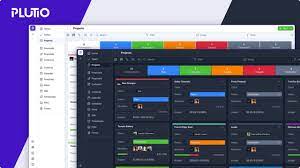The Importance of Task Tracking in Business
Task tracking is a crucial aspect of managing projects and ensuring productivity in any business setting. It involves monitoring and recording the progress of various tasks, activities, and assignments within a project or workflow. By implementing effective task tracking systems, businesses can streamline their operations, improve efficiency, and achieve better results.
One of the key benefits of task tracking is that it provides visibility into the status of each task and helps teams stay organised and focused. By tracking tasks in real-time, project managers can identify potential bottlenecks, allocate resources effectively, and make informed decisions to keep projects on track.
Task tracking also promotes accountability among team members. When tasks are assigned with clear deadlines and expectations, individuals are more likely to take ownership of their work and deliver results on time. This accountability fosters a culture of responsibility and enhances overall team performance.
Furthermore, task tracking enables businesses to prioritise tasks based on their importance and urgency. By categorising tasks according to their significance, teams can allocate resources efficiently and ensure that critical objectives are met promptly. This approach helps businesses optimise their workflow and achieve better outcomes.
In today’s fast-paced business environment, where deadlines are tight and resources are limited, effective task tracking is essential for success. By leveraging task tracking tools and methodologies, businesses can enhance collaboration, boost productivity, and drive continuous improvement across their projects and operations.
Overall, task tracking plays a vital role in enhancing project management practices and facilitating successful outcomes in business endeavours. By adopting a systematic approach to monitoring tasks and activities, businesses can maximise efficiency, minimise risks, and achieve greater success in today’s competitive landscape.
Effective Task Tracking: 7 Essential Tips for Optimal Productivity
- Break down tasks into smaller, manageable steps.
- Set clear deadlines for each task.
- Use a task tracking tool or app to stay organised.
- Regularly review and update your task list.
- Prioritise tasks based on importance and urgency.
- Delegate tasks when possible to lighten your workload.
- Celebrate small achievements to stay motivated.
Break down tasks into smaller, manageable steps.
Breaking down tasks into smaller, manageable steps is a valuable tip in task tracking that can significantly enhance productivity and efficiency. By dividing complex tasks into smaller sub-tasks, individuals can approach their work more methodically and focus on completing one step at a time. This approach not only helps in maintaining clarity and focus but also provides a sense of accomplishment as each smaller task is completed. Breaking down tasks into manageable steps also allows for better tracking of progress, enabling individuals to stay on schedule and meet deadlines effectively.
Set clear deadlines for each task.
Setting clear deadlines for each task is a fundamental tip in effective task tracking. By establishing specific timeframes for completing tasks, teams can prioritise their work, stay focused, and ensure timely delivery of project milestones. Clear deadlines create a sense of urgency and accountability among team members, encouraging them to work efficiently and meet targets. Additionally, having well-defined deadlines helps project managers allocate resources effectively and monitor progress more accurately, leading to improved project outcomes and overall productivity.
Use a task tracking tool or app to stay organised.
Utilising a task tracking tool or app is a valuable strategy to enhance organisation and efficiency in managing tasks. By leveraging such tools, individuals and teams can centralise task management, set priorities, establish deadlines, and track progress in a systematic manner. Task tracking tools provide visibility into upcoming tasks, overdue assignments, and completed activities, allowing users to stay on top of their workload and ensure nothing falls through the cracks. With the convenience and functionality offered by task tracking tools, individuals can streamline their workflow, improve time management, and ultimately boost productivity in achieving their goals.
Regularly review and update your task list.
Regularly reviewing and updating your task list is essential for effective task tracking and time management. By revisiting your task list frequently, you can assess progress, identify any new priorities or changes in deadlines, and adjust your schedule accordingly. This practice helps you stay organised, focused, and on track to meet your goals. Updating your task list ensures that you are always working on the most current and important tasks, enabling you to maximise productivity and efficiency in managing your workload.
Prioritise tasks based on importance and urgency.
In the realm of task tracking, a valuable tip to enhance productivity is to prioritise tasks according to their importance and urgency. By categorising tasks based on these criteria, individuals and teams can focus their efforts on tackling high-priority and time-sensitive assignments first, ensuring that critical objectives are met efficiently. This approach not only helps in managing workloads effectively but also enables businesses to optimise resource allocation and achieve optimal results in a timely manner.
Delegate tasks when possible to lighten your workload.
Delegating tasks whenever feasible is a valuable strategy to alleviate your workload effectively. By assigning responsibilities to capable team members or colleagues, you not only distribute the work more evenly but also empower others to contribute their skills and expertise to the project. Delegation fosters collaboration, promotes efficiency, and allows you to focus on high-priority tasks, ultimately enhancing productivity and achieving better results.
Celebrate small achievements to stay motivated.
Celebrating small achievements is a powerful strategy to maintain motivation when task tracking. Recognising and acknowledging even the smallest milestones along the way can boost morale, instil a sense of accomplishment, and keep individuals motivated to continue progressing towards their goals. By celebrating these incremental victories, individuals are more likely to stay engaged, focused, and driven to tackle the next tasks with renewed enthusiasm and determination.

